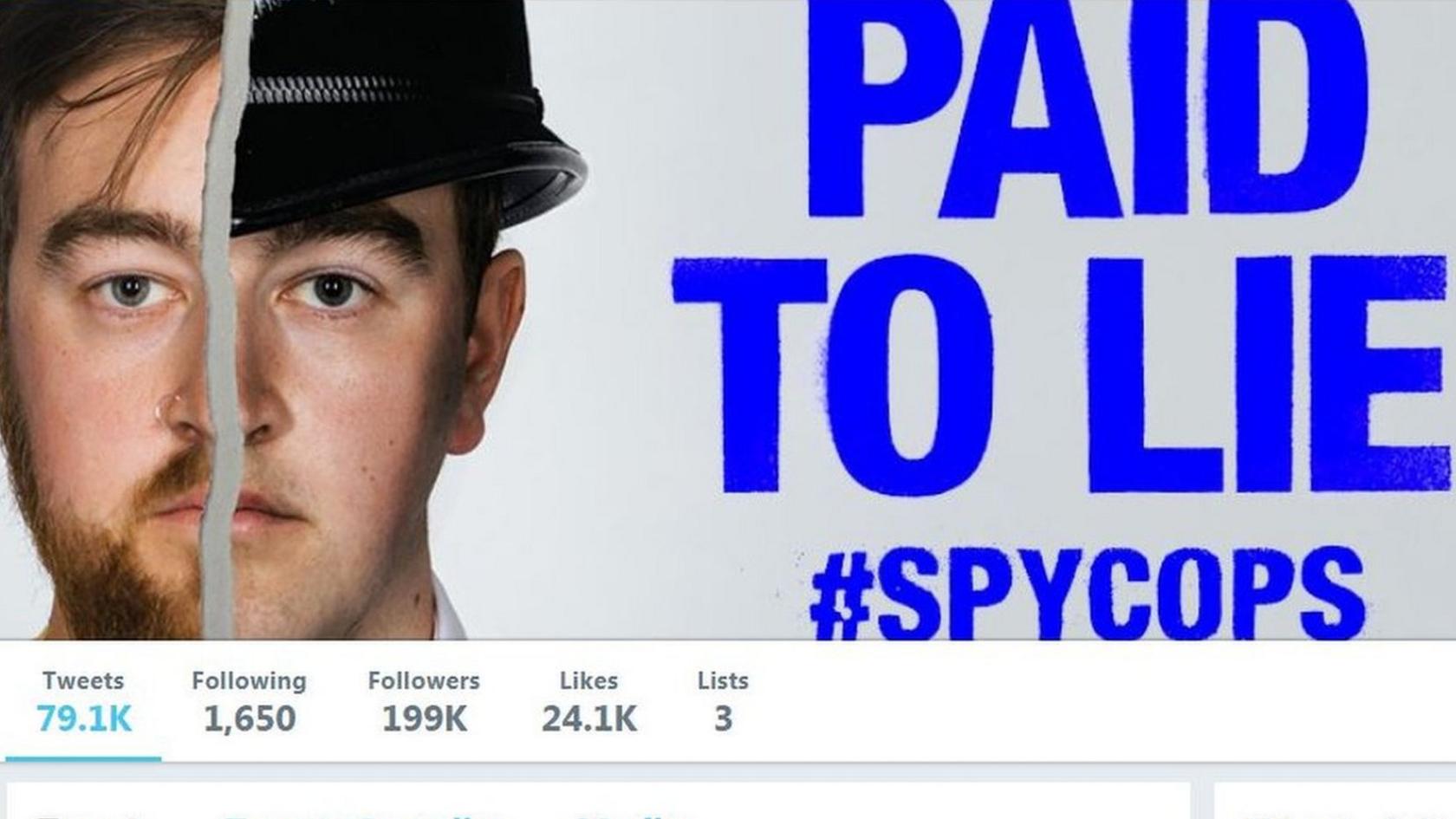Undercover police: Women were 'victims of co-ordinated rape'
- Published
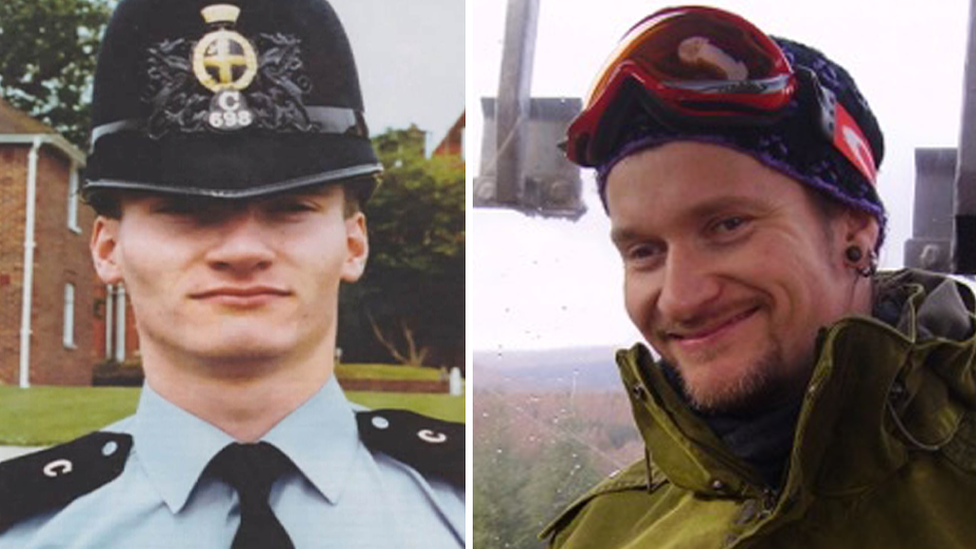
Mark Kennedy (left) in his police uniform and (right) in his undercover days, when he used the name Mark Stone
A woman who found out her partner was a policeman paid to spy on her group of activists has said she is the victim of a "conspiracy to rape".
Rosa and another woman have spoken of feeling betrayed after falling in love with men who turned out to be spies.
An ongoing public inquiry into undercover policing has seen several women get apologies and compensation.
Police said officers who had long-term sexual relationships with their targets "abused their positions".
"If you put all these things together, you have a team of officers conspiring to rape," said Rosa - not her real name - who told BBC Wales Investigates she discovered the man she thought was her long-term partner was a paid police spy.
"They know there was no informed consent.
"It's the whole gang of them, and there's no other way of terming it for me than a gang.
"You've got mentors, you've got handlers a whole backroom team of people monitoring - and directing it would seem - their relationships, their activities."
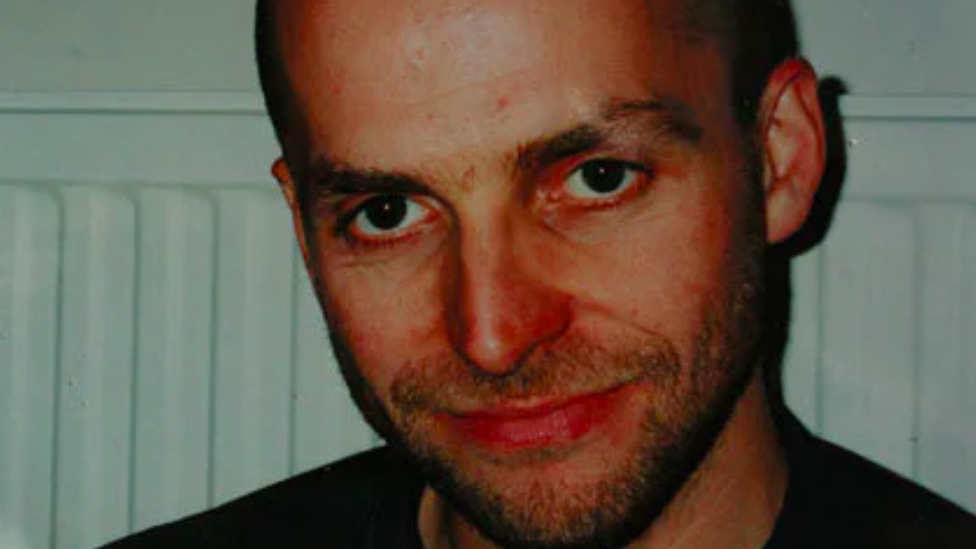
Det Con Jim Boyling, who had a relationship with a woman he was spying on
For the first time Rosa, and another woman - both from Wales - have revealed on camera the full story of how they became involved in intimate relationships which seemed genuine, but were in fact charades as police forces infiltrated groups they thought needed monitoring.
BBC Wales Investigates has spoken to people and groups across the country coming to terms with finding out the men who posed as friends, fellow campaigners and in some cases lovers, were living a lie.
In 2000, Rosa spent three months in South Africa looking for Jim Sutton, the man she was in love with. The trouble was that man did not really exist.
Rosa met him in a London pub while she was a political activist in a group called Reclaim the Streets. The pair fell for each other quickly, to the extent that Rosa wanted to call the relationship off.
"It was too intense for me… I felt like I could forget to breathe. He seemed to be my life partner, he seemed to be some kind of blueprint I didn't even know I was looking for," she added.
They were together for 10 months, but the man who called himself Jim Sutton was not who he claimed to be. He was an undercover policeman.
Rosa said she and Jim were talking about having children, and moving to Wales, where she had family. Then Jim stunned her by saying he wanted to go travelling - on his own - to "sort his head out".
He left, saying his plan was to go to Turkey, Syria and then South Africa. After months missing, Jim got back in touch. Rosa started her own detective work, and could find no trace of the family he said he had. So she headed to South Africa, to find him.
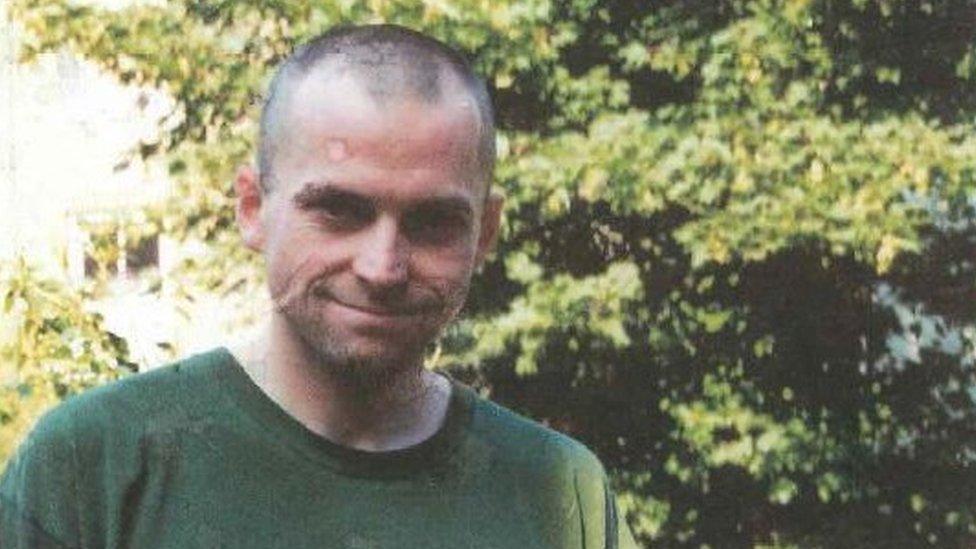
Jim Boyling, who used the name Jim Sutton while working as an undercover policeman
"I was walking round South Africa just saying 'excuse me have you seen this person?'. I was in torture, I needed answers."
She found no trace of him, and returned to the UK. Her search continued though, and clues led her to south London, and the offices of the secret police unit Jim worked for. Just two days later he re-appeared.
"I was in the fiction section - if you made a film out of this you'd say this is not realistic - and in he walked," she added.
Rosa believes his reappearance was no coincidence. She believes she had triggered a response from the police and Jim had been sent to find out how much she knew.
The encounter forced Jim to confess he had been living a lie. He was not Jim Sutton, he was police officer Jim Boyling.
Rosa said he told her he actually empathised with activists like her and was not spying on them but was instead working on a separate, criminal investigation.
She said this was another lie and said she was deceived for a second time - but that deception only came to light after she and Jim were married and had two children together.
Two women had long-term relationships with men only to learn they were undercover officers
Rosa said she was so damaged that she found it easy to believe Jim.
"The idea that my partner had never existed and was played by an actor, sent in by the state in order to spy on me as a peaceful green activist, was ludicrous and shook everything I believe in, so he was telling me stuff I knew, that I thought I knew," she added.
There was no happy ending however. Rosa said Jim was controlling and manipulative - allegations he denies - and eventually she fled to a women's refuge in Wales and the couple divorced.
Mark Stone and his partner of six years Lisa were on holiday in Italy in 2010 when she opened the glove compartment of his van looking for a pair of sunglasses. What she found inside would begin a process which dismantled undercover policing in the UK.
It was a passport. The picture in it was the Mark she knew but the name next to it said his surname was Kennedy, not Stone. It also said he had children.
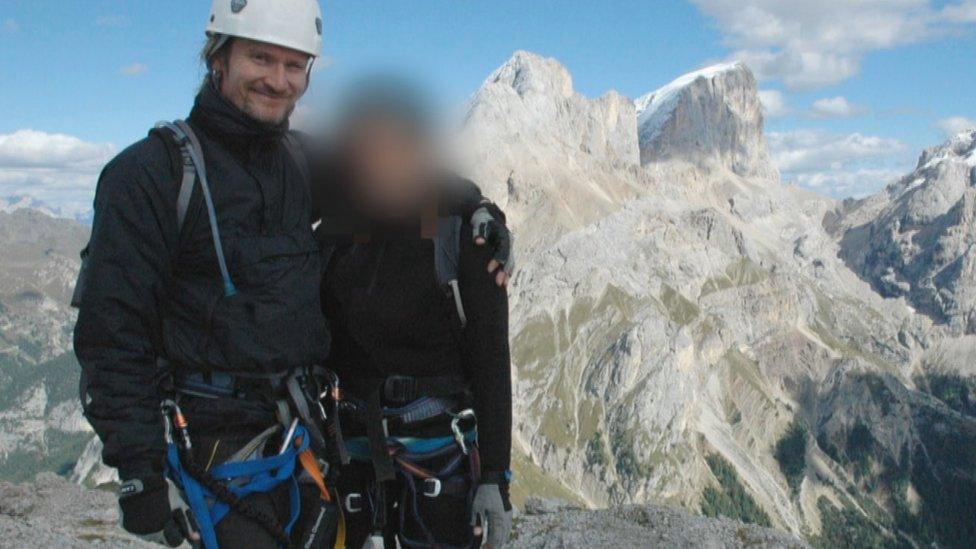
Mark Kennedy with 'Lisa' during their relationship, when he called himself Mark Stone
What Lisa did not know was that the man she knew as Mark Stone was an undercover policeman and had been paid to spy on her group of environmental activists. His covert deployment had just finished and he had handed back all his false documents - including his passport.
It was a stroke of bad luck for him, and the Metropolitan Police, that she found the real one.
Like Rosa, Lisa said the violation of trust by Mark and his employers feels like rape.
"It's been difficult for me to think of it in those words [rape] but I actually think that was what it was when it comes down to it.
"And the thing that also makes me feel even more violated, most violated, is that this deception, this relationship, this abuse wasn't just being perpetrated by one person. It wasn't just between myself and Mark, it was the whole police department."
Lisa, a committed environmental activist, met Mark in 2004. A willing participant in protests, he told her he was a professional climber.
Although there were moments when Lisa had her suspicions, such as never meeting his parents, his stories about his difficult upbringing which left him with a frosty relationship with his family eased any concerns. On top of that, she was in love.
"He wasn't just somebody who was fleetingly in and out of my life. He was somebody I did everything with. I really did think we had a future together. This was somebody I was planning my life with," she said.
In 2009, Mark suddenly left. He was gone for three months, with Lisa fearing he had had some sort of breakdown. Then, out of the blue, he returned. Their reunion led to the holiday in Italy, and the discovery of the fake passport.
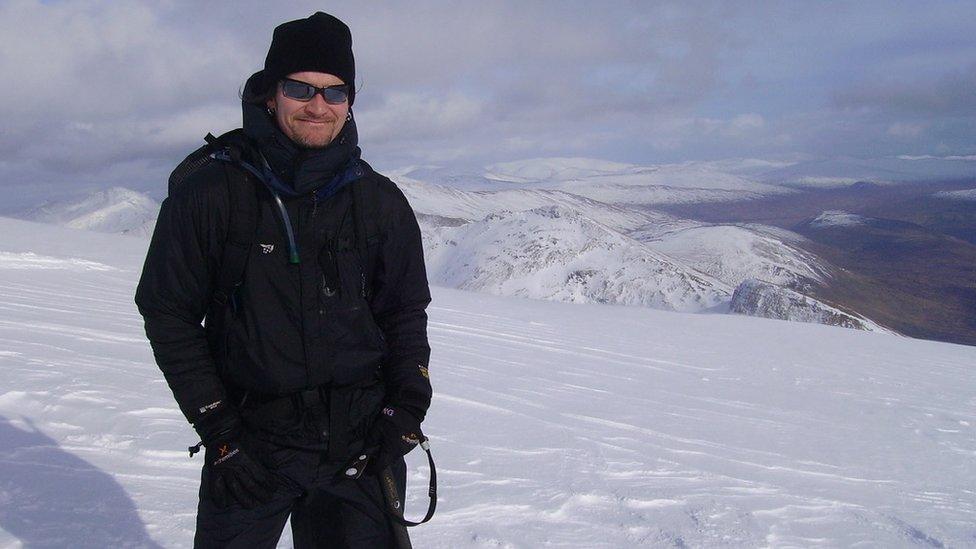
Undercover policeman Mark Kennedy on holiday with his partner
Lisa and a friend began to investigate to find out who Mark really was and discovered he was married, had two children and lived in Ireland. Armed with this knowledge, Lisa and her fellow activists confronted Mark. In the face of the evidence, he had to admit who he really was.
"He was in tears and I was in tears," recalled Lisa. "It was a hugely difficult and emotional evening. It's a very difficult memory to be thinking about."
The confirmation that Mark Kennedy was a police spy was the first step in the undercover policing network in England and Wales collapsing.
Dozens of undercover officers were unmasked, and when it emerged that police had even spied on the family of Stephen Lawrence, the teenager murdered in London in 1993, Theresa May - then Home Secretary - ordered a public inquiry, external.
'Some officers abused their positions'
The Metropolitan Police told BBC Wales Investigates: "The Metropolitan Police Service has made clear its position on long-term, sexual relationships some undercover officers are known to have entered into with women in the past. These relationships were wrong and should not have happened.
"Undercover policing is a lawful and important tactic that takes dangerous offenders off the streets and helps protect communities, but cases such as these demonstrate that some officers abused their positions."
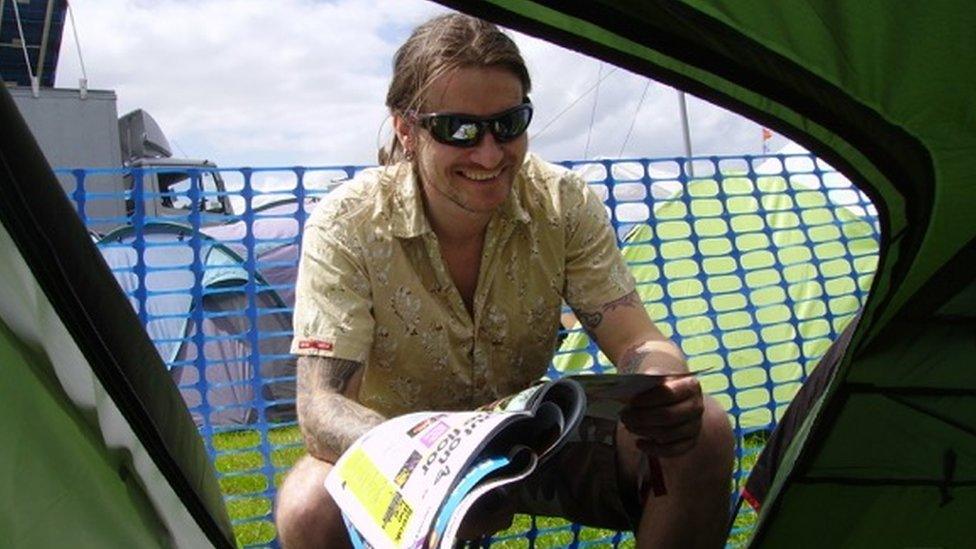
Policeman Mark Kennedy at the Glastonbury Festival during the time he was working undercover
Mark Kennedy and Jim Boyling both declined interviews with BBC Wales Investigates. In a statement in April 2018, Jim said his relationship with Rosa was genuine, and did not come about because she was a person of interest to the police.
"I trust a more accurate picture of police covert operations may emerge from the Undercover Policing Inquiry, including perhaps the testimony of others who formed genuine relationships during the course of a deployment lasting several years," he said.
Mark, speaking to the BBC's Victoria Derbyshire in 2012, insisted his relationship with Lisa was built on genuine affection, and denied filing reports about her to the police.
"I know that the relationship we had - outside of what the names were - was probably one of the most loving experiences I've ever had," he said.
In 2018 the Met admitted that Mark's handler and line manager knew about and approved him having a sexual relationship with another activist.
Jim was sacked by the Met for gross misconduct because of his relationship with Rosa. The disciplinary panel said: "The system of control and governance over officers like DC Boyling was severely lacking."
But despite apologies from the police and compensation, Rosa and Lisa say their sense of betrayal remains.
"When people have had bereavement, you need to know what happened to a loved one before you can move on. In this case it almost feels as if there was a bereavement but I haven't just found out my partner has died, I found out he never existed in the first place," said Lisa.
BBC Wales Investigates Undercover Cops: Abuse of Duty on Monday, 4 March at 20:30 GMT on BBC One Wales.
- Published14 December 2018
- Published11 January 2011
- Published1 June 2018
